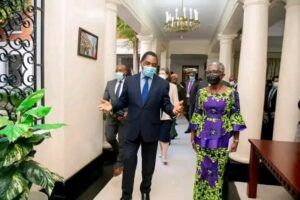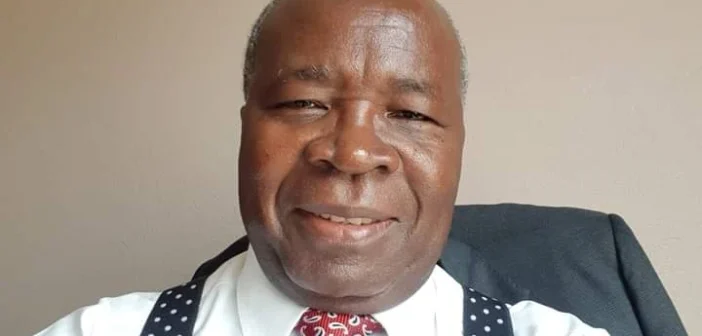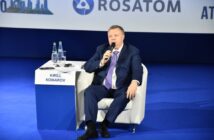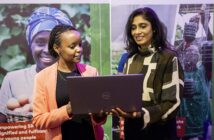Republic of Zambia
Ministry of Finance & National Planning www.mofnp.gov.zm
ZAMBIAN DELEGATION ARRIVES IN USA FOR THE 2023 SPRING MEETINGS OF THE INTERNATIONAL MONETARY FUND (IMF) AND THE WORLD BANK GROUP (WBG)
Sunday, 9th April, 2023 – A high-level Zambian delegation led by Finance and National Planning Minister Dr SITUMBEKO MUSOKOTWANE has arrived in Washington DC, United States of America, for the 2023 SPRING MEETINGS OF THE INTERNATIONAL MONETARY FUND AND THE WORLD BANK GROUP, which commence tomorrow Monday 10th April and end on Sunday, 16th April, 2023.
Dr MUSOKOTWANE is accompanied to the SPRING MEETINGS by Secretary to the Treasury FELIX NKULUKUSA, Bank of Zambia Governor Dr DENNY KALYALYA, Acting Permanent Secretary (Budget & Economic Affairs) MWAKA MUKUBESA, and Bank of Zambia Deputy Governor (Operations), Dr FRANCIS CHIPIMO.
The Minister and his delegation, were met on arrival in Washington DC, by Zambia’s Deputy Ambassador to the United States of America, MARGARET KAPHIYA. Mrs. KAPHIYA welcomed the Minister and his delegation and took the opportunity to described Zambia’s participation in the meetings as a crucial step in strengthening development cooperation with the Bretton Woods Institutions (IMF and World Bank Group) and sustaining global interest in the country’s various development aspects.
During the week-long Annual Meetings, the delegation will participate in series of IMF and World Bank organised events, hold bilateral talks with other development partners, and engage investors.
IMF
Among the IMF scheduled events, the Minister and his delegation will attend the 2023 African Consultative Group Meeting of the African Caucus with the IMF Managing Director, Kristalina Georgieva, and as representatives on an IMF member country, ensure that Zambia is represented during the session of the International Monetary and Finance Committee Plenary (the highest organ of the IMF). The delegation will also hold discussions with the IMF African Department, Fiscal Affairs Department, the IMF Africa Group 1 Constituency and hold a liaison session with the IMF Mission Chief for Zambia, Ms. Allison Holland and her staff team on various aspects of cooperation between the IMF and Zambia.

President Hakainde Hichilema with IMF Deputy Managing Director
A few days ago, in Lusaka, Zambia and the IMF staff reached an agreement on various economic and financial policies that are expected to anchor the implementation of the Enhanced Credit Facility (ECF)/IMF Programme, for the next 12 months. Zambia’s agreement with the IMF staff, is subject to approval by IMF Management and the Executive Board – whose approval will trigger a second disbursement (the first one having been delivered by the Fund in September, 2022).
World Bank Group
Concerning the World Bank Group, the delegation will, among other engagements, participate in the African Consultative Group Meeting (Debt, Climate Change, MSME, Digital, Energy) with World Bank Group President David Malpas, hold separate consultative meetings with the World Bank Vice President for Eastern and Southern Africa, Victoria Kwakwa, the African Group I Constituency, and the Multilateral Institute Guarantee Agency (MIGA) of the World Bank.
Key bilateral engagements
The delegation will also meet the leadership and representatives of the Official Creditor Committee (OCC) for Zambia’s debt restructuring process. Other bilateral meetings will be with Honourable Andrew Mitchell, UK Minister of State (Development and Africa), the US Treasury, China, Germany, Belgium, Netherlands, Japan, Italy, and India, among others. Through these engagements, we look forward to breaking the debt deadlock, to help the country to widen the fiscal space and open more avenues for elevated productivity, growth, and job and wealth creation. The delegation will also take the opportunity of being in Washington DC, to meet representatives of the Millennium Challenge Corporation, and numerous investors.
Other major engagements
1) High-Level Roundtable on Challenges and Opportunities for the Rollout of the African Continental Free Trade Area Agreement (AfCFTA);
2) Public Discussion on Overcoming Debt, Generating Growth;
3) Seminar on Unlocking Financial Opportunities for the North-South Corridor;
4) Forum on achieving SDG’s in Eastern and Southern Africa;
5) Panel Discussion on Sovereign Debt Issues;
6) Southern Africa Development Community (SADC) Great Green Wall Initiative (SADC GGWI);
7) Seminar on Scaling Up Digital Investment and Innovation to Address Global Challenges;
8) Seminar on Food Security at the Nexus of Climate Change and Growth;
9) Panel discussion on Emerging Debt Crisis and Urgent Reforms to the international development finance architecture. (Organised by the Open Society Foundations and the Rockefeller Foundation);
10) Seminar on Bridging the Transition from Food Security Response to Food System Transformation: Delivering
Global Public Goods in the Era of polycrisis;
11) Human Capital Project – Ministerial Conclave; and,
12) State of the Africa Region: Harnessing natural Resources for a Sustainable Future.
Summing-up the importance of the Zambian delegations’ participation in the 2023 IMF/World Bank Group Spring Meetings, Dr MUSOKOTWANE said, “the meetings are important in our debt restructuring journey, and good for consolidating our attractiveness as one of Africa’s best investment destinations.
We look forward to the special session on concessional financing for donors and recipients – targeted at economic and financial stability in low income countries, and the anticipated agreement by high-income-countries on a medium-term strategy to place Poverty Reduction Growth Trust finances on a solid footing through adequate funding and subsidies. We believe that a positive outcome from the process, will help countries like Zambia to become more resilient and ascend to the middle-income status.
“Zambia seeks global geo-political harmony to forge international consensus on areas of common interest such as debt, food security, and income-generating opportunities for micro-small-medium scale enterprises,” the Minister stated.
Issued by:
(Original Copy Signed)
MINISTRY OF FINANCE AND NATIONAL PLANNING
REFERENCE NOTES
The Spring Meetings of the Boards of Governors of the IMF and World Bank Group take place in April in Washington, DC. The Board of Governors consists of a high-level representative from each of the 190-member countries, typically the Minister of Finance, Central Bank Governor, or Minister of Development/Planning. During the Meetings, the Governors participate in plenary sessions and discuss the challenges for the global economy. They also decide on major policy issues related to the future work of the two organizations, which are subsequently implemented by their respective Executive Boards.
In addition, the IMF’s International Monetary and Financial Committee (IMFC) and the joint IMF-World Bank Development Committee (DC) meet to discuss progress on the work of the two organizations.
The IMFC has 24 members drawn from the Board of Governors and oversees the work of the IMF. It focuses discussions on the global economy, developments in financial markets, as well as other pressing issues within the IMF’s mandate. For its part, the WBG-DC advises the Board of Governors of the World Bank on critical development issues and financial resources required to promote economic development and poverty reduction in developing countries.
At the conclusion of these meetings, the IMFC and DC release statements that provide guidance to the Executive Boards of the two institutions.
Over 10,000 people have traditionally attended the Spring meetings in person, with this number continuing to expand as the Meetings are held in a hybrid format. Participants include the Ministers/Governors themselves and their alternates, as well as members of their delegations, observers from other intergovernmental organizations, such as the Organization for Economic Co-operation and Development (OECD), the World Trade Organization (WTO), and representatives from financial institutions and bodies, such as the Financial Stability Board (FSB), as well as numerous journalists, academics, and representatives of civil society organizations.




